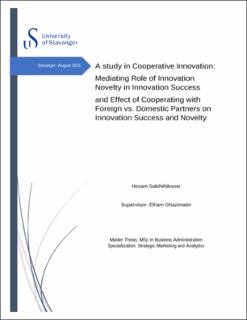| dc.description.abstract | Cooperative innovation is active participation in a joint innovation project with other partners. Cooperative innovation has recently attracted significant attention in the literature; however, it still requires a deeper scrutiny more contemplation to find out its copious aspects and its relationship with other innovation-relevant concepts. In this thesis, I examine how (1) inter-firm cooperation and (2) heterogeneity of the involved firms would lead to innovation success. In examining the hypotheses, I carried out an analysis on 2619 Indian manufacturing firms.
In the first study, I conducted a set of descriptive analyses to depict the details of the variables. I then took the degree of novelty as a mediator and tested whether/how it mediates the relationship between interfirm cooperation and firm’s heterogeneity with the innovation success. For the purpose of this study, I performed linear regression model and employed Baron and Kenny test of mediation and confirmed the results with Sobel test. The results revealed that while the degree of novelty does not mediate the effect of inter-firm cooperation on innovation success, it is a partial mediator for the effect of the portfolio heterogeneity on the innovation success that mediates just 7% of this effect. Firm size and the level of export -as control variables- were statistically significant predictors of innovation success. I showed that the other three organizational variables including internal R&D intensity, being a partial firm, and the level of expenditure on technology acquisition are insignificant in my model.
In the second study, I delved into the composition of network portfolio of the firms and examined how the cooperation with foreign vs. domestic firms influence the degree of novelty and the innovation success. Using a seemingly unrelated regression model (SUR), I found that cooperation with foreign and domestic firms increases the probability of achieving higher innovation success. The results show that, cooperation with a foreign firm can increase the sales of firms 5 times more than cooperation with a domestic firm. I did not find any evidence for the effect of domestic cooperation on the degree of novelty. However, the results showed that cooperation with a foreign partner significantly increases the level of novelty of innovation, meaning that it would have a profound impact to help the firm diffuse to the international market. | |
